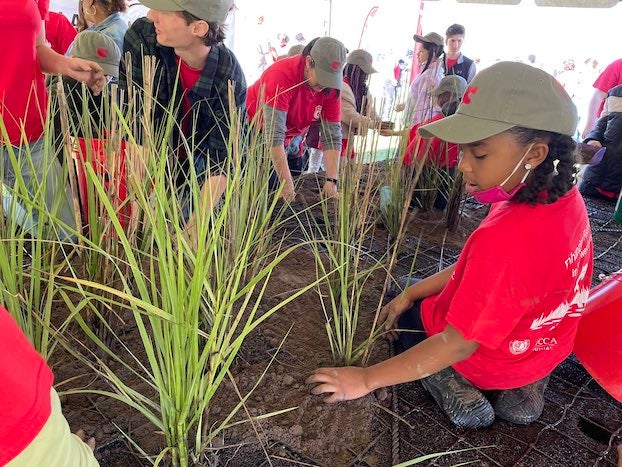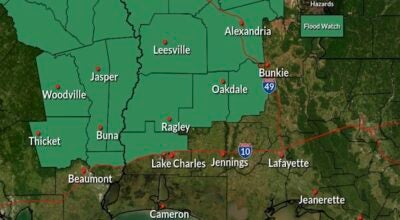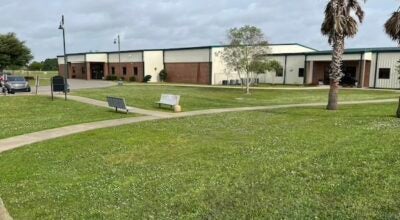Students doing their part to restore coastal land
Published 2:52 pm Friday, April 1, 2022

- Students from area schools planted grasses on 10 large floating islands that were taken by boat to Prien Lake on Friday. The effort is designed to restore coastal land lost during Hurricanes Laura and Delta. (John Guidroz / American Press)
Roughly 150 students from area schools met at Prien Lake Park Friday to plant grasses on 10 large floating islands that were taken by boat to Prien Lake. The effort is designed to help restore coastal land lost during Hurricanes Laura and Delta.
The Coastal Conservation Association and Phillips 66, which contributed $100,000, partnered in the effort. Students from Bishop Noland Episcopal Day School, LaGrange High School, Westlake High School and Pearl Watson Elementary School planted the grasses.
Ed Landgraf, Coastal Conservation Association volunteer and event project manager, said these floating island projects have been done statewide. These islands are the largest put out so far, measuring 9 feet wide by 20 feet long.
“Each island has 150 plant receptacles, so we’re going to have a total of 1,500 plants going in on this project,” he said. “We estimate each plant will germinate about five or six times.”
The floating islands were deployed to marshland in Prien Lake about 2.5 miles from the park’s boat launch and were tied to anchors already in the field. Over time, Landgraf said, the plants will grow through the island and adhere to the natural water bottom.
“It’s a non-typical partnership between an oil and gas industry and an environmental organization, but it works so well,” he said. “At the end of the day, I think we all have some common goals of protecting the environment in our communities.”
Regina Smart, agriscience teacher at Westlake High School, said this project not only gives her students the chance to give back to the community, but helps them better understand the need to stop coastal land loss.
“It’s one thing for us to stand in the classroom and tell our students this is happening,” she said. “It’s different when they can actually see it and have a hands-on activity. They’re not just learning about the problem; they’re being part of a solution.”
Jayse Peshoff, a 17-year-old student at Westlake High, said the destruction Hurricane Laura had on waterways in August 2020 was immediately evident.
“It tore up our bayous and all the swamp islands, and a lot of plants died,” he said. “It’s a good thing we’re doing this, and I really think it will bring back more aquatic wildlife to our area.”
Jolie Rhinehart, refinery manager of the Phillips 66 Lake Charles Manufacturing Complex, said environmental sustainability is one of the company’s core values. She said Phillips 66 has donated $500,000 to coastal conservation in Southwest Louisiana and has partnered with the CCA for more than five years.
“It’s really vital to us that we support our community and get us back to a healthy environment,” she said.
The Stream family allowed for land to be used to anchor the floating islands. Dean Roberts, a biologist with Stream Wetland Services, said the company’s local nursery grew the high-salinity grass that was planted on the islands.





